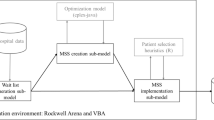Abstract
Operation theatre is one of the most significant assets in a hospital as the greatest source of revenue as well as the largest cost unit. This paper focuses on surgery scheduling optimization, which is one of the most crucial tasks in operation theatre management. A combined scheduling policy composed of three simple scheduling rules is proposed to optimize the performance of scheduling operation theatre. Based on the real-life scenarios, a simulation-based model about surgery scheduling system is built. With two optimization objectives, the response surface method is adopted to search for the optimal weight of simple rules in a combined scheduling policy in the model. Moreover, the weights configuration can be revised to cope with dispatching dynamics according to real-time change at the operation theatre. Finally, performance comparison between the proposed combined scheduling policy and tabu search algorithm indicates that the combined scheduling policy is capable of sequencing surgery appointments more efficiently.



Similar content being viewed by others
References
Denton, B., Viapiano, J., and Vogl, A., Optimization of surgery sequencing and scheduling decisions under uncertainty. Health Care Manag Sci 10(1):13–24, 2007.
Guerriero, F., and Guido, R., Operational research in the management of the operating theatre: A survey. Health Care Manag. Sci. 14(1):89–114, 2011.
Testi, A., Tànfani, E., and Torre, G., A three-phase approach for operating theatre schedules. Health Care Manag. Sci. 10(2):163–172, 2007.
Blake, J., and Carter, M., A goal programming approach to strategic resource allocation in acute care hospitals. Eur. J. Oper. Res. 140(3):541–561, 2002.
Dexter, F., Ledolter, J., and Wachtel, R., Tactical decision making for selective expansion of operating room resources incorporating financial criteria and uncertainty in sub-specialties future workloads. Anesth. Analg. 100(5):1425–1432, 2005.
Wachtel, R., and Dexter, F., Tactical increases in operating room block time for capacity planning should not be based on utilization. Anesth. Analg. 106(1):215–226, 2008.
Zhang, B., Murali, P., Dessouky, M., et al., A mixed integer programming approach for allocating operating room capacity. J. Oper. Res. Soc. 60(5):663–673, 2009.
Beliën, J., Demeulemeester, E., and Cardoen, B., Building cyclic master surgery schedules with levelled resulting bed occupancy: A case study. Eur. J. Oper. Res. 176(2):1185–1204, 2007.
Oostrum, J., Houdenhoven, M., Hurink, J., et al., A master surgical scheduling approach for cyclic scheduling in operating room departments. OR Spectr. 30(2):355–374, 2008.
Adan, I., Bekkers, J., Dellaert, N., et al., Patient mix optimisation and stochastic resource requirements: A case study in cardiothoracic surgery planning. Health Care Manag. Sci. 12(2):129–141, 2009.
Banditori, C., Cappanera, P., and Visintin, F., A combined optimization–simulation approach to the master surgical scheduling problem. IMA J. Manag. Math. 24(2):155–187, 2013.
Choi, S., and Wilhelm, W., On capacity allocation for operating rooms. Comput. Oper. Res. 44(1):174–184, 2014.
Gabel, R., Kulli, J., Stephen Lee, B., et al., Operating room management. Butterworth-Heinemann, London, 1999.
Ozkarahan, I., Allocation of surgeries to operating rooms using goal programming. J. Med. Syst. 24(6):339–378, 2000.
Guinet, A., and Chaabane, S., Operating theatre planning. Int. J. Prod. Econ. 85(1):69–81, 2003.
Lamiri, M., Xie, X., Dolgui, A., and Grimaud, F., A stochastic model for operating room planning with elective and emergency demand for surgery. Eur. J. Oper. Res. 185(3):1026–1037, 2008.
Fei, H., Chu, C., Meskens, N., and Artiba, A., Solving surgical cases assignment problem by a branch-and-price approach. Int. J. Prod. Econ. 112(1):96–108, 2008.
Hans, E., Wullink, G., Houdenhoven, M., et al., Robust surgery loading. Eur. J. Oper. Res. 185(3):1038–1050, 2008.
Marques, I., Captivo, M., and Pato, M., An integer programming approach to elective surgery scheduling. OR Spectr. 34(2):407–427, 2012.
Rizk, C., and Arnaout, J., ACO for the surgical cases assignment problem. J. Med. Syst. 36(3):1191–1199, 2012.
Beliën, J., and Demeulemeester, E., Building cyclic master surgery schedules with leveled resulting bed occupancy. Eur. J. Oper. Res. 176(2):1185–1204, 2007.
Hsu, V. N., de Matta, R., and Lee, C. Y., Scheduling patients in an ambulatory operation theatre. Nav. Res. Logist. 50(3):218–238, 2003.
Blake, J. T., Dexter, F., and Donald, J., Operating room manager’s use of integer programming for assigning block time to surgical groups: A case study. Anesth. Analg. 94(1):143–148, 2002.
Rohleder, T. R., Lewkonia, P., Bischak, D. P., et al., Using simulation modeling to improve patient flow at an outpatient orthopedic clinic. Health Care Manag. Sci. 14(2):135–145, 2011.
Ahmed, M. A., and Alkhamis, T. M., Simulation optimization for an emergency department healthcare unit in Kuwait. Eur. J. Oper. Res. 198(3):936–942, 2009.
Saremi, A., Jula, P., ElMekkawy, T., et al., Appointment scheduling of outpatient surgical services in a multistage operating room department. Int. J. Prod. Econ. 141(2):646–658, 2013.
Aringhieri, R., Landa, P., Soriano, P., et al., A two level meta heuristic for the operating room scheduling and assignment problem. Comput. Oper. Res. 54(1):21–34, 2015.
Choi, S., and Wilhelm, W., An approach to optimize block surgical schedules. Eur. J. Oper. Res. 235(1):138–148, 2014.
Aringhieri, R., Tànfani, E., and Testi, A., Operations research for health care delivery. Comput. Oper. Res. 40(9):2165–2166, 2013.
M’Hallah, R., and Al-Roomi, A. H., The planning and scheduling of operating rooms: A simulation approach. Comput. Ind. Eng. 78(08):235–248, 2014.
Panwalkar, S. S., and Iskander, W., A survey of scheduling rules. Oper. Res. 25(1):45–61, 1977.
Box, G. E. P., and Wilson, K. B., On the experimental attainment of optimum conditions. J. R. Stat. Soc. Ser. B 13(1):1–45, 1951.
Acknowledgments
The work described in this paper was substantially supported by Research Grants from National Natural Science Foundation of China (71271122 and 71201087).
Author information
Authors and Affiliations
Corresponding author
Additional information
This article is part of the Topical Collection on Systems-Level Quality Improvement
Rights and permissions
About this article
Cite this article
Liang, F., Guo, Y. & Fung, R.Y.K. Simulation-Based Optimization for Surgery Scheduling in Operation Theatre Management Using Response Surface Method. J Med Syst 39, 159 (2015). https://doi.org/10.1007/s10916-015-0349-5
Received:
Accepted:
Published:
DOI: https://doi.org/10.1007/s10916-015-0349-5




